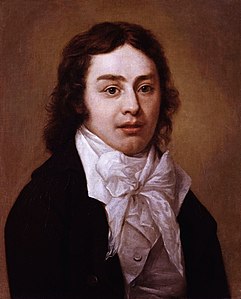Analysis of From 'Religious Musings'
THERE is one Mind, one omnipresent Mind,
Omnific. His most holy name is Love.
Truth of subliming import! with the which
Who feeds and saturates his constant soul,
He from his small particular orbit flies
With blest outstarting! From himself he flies,
Stands in the sun, and with no partial gaze
Views all creation; and he loves it all,
And blesses it, and calls it very good!
This is indeed to dwell with the Most High!
Cherubs and rapture-trembling Seraphim
Can press no nearer to the Almighty’s throne.
But that we roam unconscious, or with hearts
Unfeeling of our universal Sire,
And that in His vast family no Cain
Injures uninjured (in her best-aimed blow
Victorious Murder a blind Suicide)
Haply for this some younger Angel now
Looks down on Human Nature: and, behold!
A sea of blood bestrewed with wrecks, where mad
Embattling Interests on each other rush
With unhelmed rage!
’Tis the sublime of man,
Our noontide Majesty, to know ourselves
Parts and proportions of one wondrous whole!
This fraternizes man, this constitutes
Our charities and bearings. But ’tis God
Diffused through all, that doth make all one whole;
This the worst superstition, him except
Aught to desire, Supreme Reality!
The plenitude and permanence of bliss!
Toy-bewitched,
Made blind by lusts, disherited of soul,
No common centre Man, no common sire
Knoweth! A sordid solitary thing,
Mid countless brethren with a lonely heart
Through courts and cities the smooth savage roams
Feeling himself, his own low self the whole;
When he by sacred sympathy might make
The whole one Self! Self, that no alien knows!
Self, far diffused as Fancy’s wing can travel!
Self, spreading still! Oblivious of its own,
Yet all of all possessing! This is Faith!
This the Messiah’s destined victory!
| Scheme | XXXABBXXXXXCXDXXXXXXXXXXAXXAXEX XADXXXAXXXCXE |
|---|---|
| Poetic Form | |
| Metre | 111110101 11110111 11101101 11011101 11110100101 11110111 1001011101 1101001111 0101011101 1101111011 100101001 111101011 111110111 01011001010 0101110011 1001000111 0100100110 111110101 1111010001 011111111 11011101 111 100111 10110011001 1001011101 111110 10100010111 0111111111 101010101 110100110 01010011 101 1111111 11010111010 10101001 1101010101 1101001101 1001111101 1111010011 01111111001 1101111110 11010100111 1111010111 1001010100 |
| Closest metre | Iambic pentameter |
| Characters | 1,882 |
| Words | 299 |
| Sentences | 22 |
| Stanzas | 2 |
| Stanza Lengths | 31, 13 |
| Lines Amount | 44 |
| Letters per line (avg) | 32 |
| Words per line (avg) | 7 |
| Letters per stanza (avg) | 701 |
| Words per stanza (avg) | 148 |
Font size:
Submitted on May 13, 2011
Modified on March 05, 2023
- 1:29 min read
- 130 Views
Citation
Use the citation below to add this poem analysis to your bibliography:
Style:MLAChicagoAPA
"From 'Religious Musings'" Poetry.com. STANDS4 LLC, 2024. Web. 27 Apr. 2024. <https://www.poetry.com/poem-analysis/34251/from-%27religious-musings%27>.


Discuss this Samuel Taylor Coleridge poem analysis with the community:
Report Comment
We're doing our best to make sure our content is useful, accurate and safe.
If by any chance you spot an inappropriate comment while navigating through our website please use this form to let us know, and we'll take care of it shortly.
Attachment
You need to be logged in to favorite.
Log In